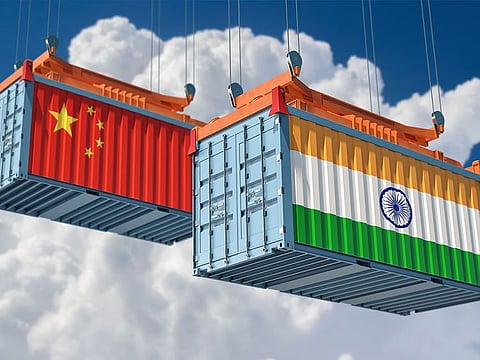India-China trade flows show merit of keeping political relations separate
Political tensions have so often rudely intruded into trade affairs

It is no surprise there is a confusion prevailing between theory and practice when discussing the inseparability of economics and politics. This is because politics is an intense economy. While it is true that there are specialized departments such as a ‘Faculty of Political Economy’ at many universities, in practice, this theoretical link can harm the economic interests of conflicting parties.
History has shown it is important to separate political tensions or differences from economic and trade cooperation, to better preserve or enhance the gains achieved. Failure to do so can lead to exclusion and significant economic losses for all parties involved.
Significant trade gains
Despite their significant political differences, China and India have formed a robust economic alliance. This separation between politics and economic cooperation is exemplified by their participation in blocs such as the Shanghai Cooperation Organization and BRICS.
Although there have been conflicts resulting from the border dispute between the two countries, their bilateral and collective economic cooperation has led to a remarkable increase in trade exchange. Last year, the trade between the two surged 34 per cent to $116 billion, a significant jump from the $3 billion recorded two decades ago. China is now India’s largest trading partner, while India is China’s biggest trading partner in South Asia.
This is a practical example reflecting the importance of distinguishing between theoretical and practical aspects and avoiding confusion. Failure to make this distinction can lead to severe damage, as we have seen in various parts of the world where political tensions adversely affect economic relations.
Sanctions, boycotts, and trade embargoes are readily available and easy tools that require only a short text and signature to implement, but their negative repercussions are limitless. Such measures affect both sides’ consumers and may take a long time to recover from, especially since some parties may seek alternative solutions. These options may be of lower quality and higher prices.
Arab economies have felt it deeply
It is important to note that even after overcoming political differences, some of the damage done may be irreparable. Even developed countries, which are expected to be more rational and pragmatic, are not immune to this confusion. The Arab region and the Middle East are particularly susceptible to damage caused by such confusion, for a variety of reasons. Therefore, it is imperative to exercise caution and avoid hasty punitive economic and commercial measures. There is a need to recognize that political differences can always be resolved and their repercussions can be overcome in many cases.
However, overcoming the economic consequences of such measures often requires complex procedures and additional efforts. Furthermore, the methods of conducting trade and business differ significantly from the methods used to manage political relations.
India-China economic cooperation stands as a unique case in international relations, given the persistent political and military tension between the two countries. This relationship prompts an examination of potential reasons, some of which may be rooted in cultural aspects. Historically, both nations have been known for their wisdom in managing their affairs.
The accumulation of a culture of wisdom plays a crucial role in handling matters at all levels, contrasting with a culture that embraces superiority based on racial or ethnic grounds. Further, a culture of violence is another factor that can contribute to the blurring of theoretical and practical boundaries between the economic and political spheres in certain contexts.
Not an utopian ideal
Imagine if the rest of the world were to adopt the Sino-Indian wisdom; global economic and trade conditions would undergo a radical transformation, and all nations would reap the benefits of this progress. By setting political disputes aside. A path would be cleared for the establishment of mutually beneficial economic relations among all involved.
The question is whether we are discussing utopian ideals or practical ideas. We believe it is the latter, as the close cooperation between India and China provides a tangible, successful example. Among numerous agreements, India consented to the establishment of the BRICS Bank headquarters in Shanghai, China.
This bank also includes Russia, Brazil, and South Africa, with more countries, such as some Arab and Gulf nations, expected to join. This suggests that these two ancient Asian countries offer a valuable experience that can serve as a model for creating a more stable, prosperous, and harmonious world with reduced poverty.
Sign up for the Daily Briefing
Get the latest news and updates straight to your inbox


